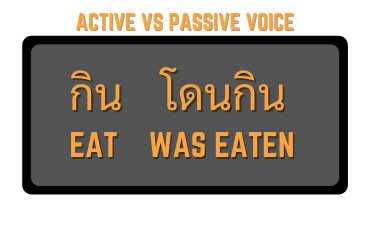In this article, I will teach you about how to use active and passive voice in Thai.

Active voice is when the subject acts upon its verb (ex: I eat the food).
Passive voice means that a subject is a recipient of a verb’s action (The food was eaten).
Let’s look at some examples in English:
| TENSE | ACTIVE | PASSIVE |
|---|---|---|
| Present Simple | I kick the door | The door was kicked |
| Present Continuous | I’m kicking the door | The door is being kicked |
| Past Simple | I kicked the door | The door was kicked |
| Past Perfect | I had kicked the door | The door had been kicked |
| Future simple | I will kick the door | The door will be kicked |
Thank god that Thai is not as hard as English. We don’t have that many tenses and many times the context helps us know if the sentence is past or future tense without adding any need for extra words.
But to be very precise you can add …แล้ว at the end of the sentence to make it past tense. And also จะ… to make it clear that you are talking about the future.
To make a sentence passive just add ถูก or โดน.
โดน is more colloquial than ถูก. In a more formal situation like talking to a client, you should use ถูก. With friends both are acceptable.
| ACTIVE | PASSIVE |
|---|---|
| กิน = to eat | ถูก/โดน กิน = was eaten |
| ตี = to hit | ถูก/โดน ตี = was hit |
| มอง = to look | ถูก/โดนมอง = was looked at |
| เข้าใจผิด = to misunderstand | ถูก/โดนเข้าใจผิด = was misunderstood |
| ขาย = to sell | ถูก/โดนขาย = was sold |
| ซื้อ = to buy | ถูก/โดนขาย = was bought |
| ฆ่า = to kill | ถูก/โดนฆ่า = was killed |
| ปฏิเสธ = to reject | ถูก/โดน ปฏิเสธ = was rejected |
| ทิ้ง = to throw/dump someone | ถูก/โดนทิ้ง = was dumped |
| ด่า = scolded | ถูก/โดนด่า = was scolded |
Usage examples
Past tense
- The cat ate the rat | The rat was eaten.
แมวกินหนูแล้ว | หนูถูกกินแล้ว
maew gin nŏo láew | nŏo tòok gin láew
Present tense
- The cat eats the rat | The rat was eaten.
แมวกินหนู |หนูถูกกิน
maew gin nŏo | nŏo tòok gin
Future tense
- The cat will eat the rat | The rat will be eaten.
แมวจะกินหนู | หนูจะถูกกิน
maew jà gin nŏo | nŏo jà tòok gin
Longer sentences
- I got rejected
ผมถูกปฏิเสธ
pŏm tòok bpà-dtì-sàyt - I got rejected BY GIRLFRIEND
ผมถูกแฟนปฏิเสธ
pŏm tòok faen bpà-dtì-sàyt - I am AFRAID to get rejected by my girlfriend.
ผมกลัวถูกแฟนปฏิเสธ
pŏm glua tòok faen bpà-dtì-sàyt - I am afraid I WILL get rejected by my girlfriend.
ผมกลัวจะถูกแฟนปฏิเสธ
pŏm glua jà tòok faen bpà-dtì-sàyt
❗️❗️ Notice that for the passive voice in Thai, ถูก/โดน will be separate from the verb in long sentences AND the verb is always at the back.
Exercise:
Fill in the blanks using both active and passive words. Remember that ถูก/โดน are interchangeable and are separate from the verb in long sentences. Also, some vocabulary is written below.
แฟนผม___ผมตอนผมขอเป็นแฟน ผมคิดว่าผม___แฟน___ (rejected, was misunderstood)
หรือไม่ก็แฟนกลัว___คนรอบข้าง___ว่าเป็นผู้หญิงโง่ที่มาคบกับนักดนตรี (get looked at)
หรือไม่ก็กลัว___ว่า___ฝรั่ง* (get scolded, eat)
ผมเข้าใจแฟนแต่ผมไม่สนใจว่าจะ___ว่าอย่างไร (get looked at)
ผมรู้แค่ว่าเรารักกัน
Answer and translation below:
แฟนผม[ปฏิเสธ]ผมตอนผมขอเป็นแฟน ผมคิดว่าผม[ถูก]แฟน[เข้าใจผิด]
(My girlfriend rejected me when I asked her to be my girlfriend. I think that I was misunderstood)
หรือไม่ก็แฟนกลัว[ถูก]คนรอบข้าง[มอง]ว่าเป็นผู้หญิงโง่ที่มาคบกับนักดนตรี
(Or if not, she was scared that people around her would look at her like a stupid girl that wants to date artists.)
หรือไม่ก็กลัว[ถูกด่า]ว่า[กิน]ฝรั่ง*
(Or if not that, scared that people would scold her that she only dates “Farangs”.)
ผมเข้าใจแฟนแต่ผมไม่สนใจว่าจะ[โดนมอง]ว่าอย่างไร
(I understand my girlfriend but I don’t care how they will look at us)
ผมรู้แค่ว่าเรารักกัน
(I only know that we love each other)
Vocabulary:
- ขอเป็นแฟน = ask to become gf/bf
- คนรอบข้าง = surrounding people
- คบ = to date
*farang also means guava () = eat guava is another way of saying to want to date farang for money and not true love.
I hope you now know how to use active and passive voice in Thai.
I also have a video about this topic here:

